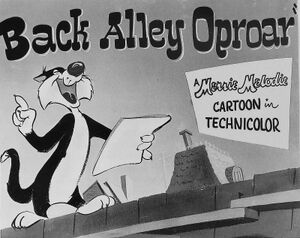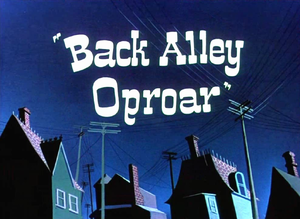Back Alley Oproar
From Looney Tunes Wiki
Jump to navigationJump to search
| Back Alley Oproar | |
|---|---|
 Lobby card. | |
| Production company | Warner Bros. Cartoons |
| Distributor | Warner Bros. Pictures The Vitaphone Corporation |
| Release date | March 27, 1948 |
| Run time | 7:42 |
| Starring | Mel Blanc Arthur Q. Bryan Gloria Curran Tudor Williams |
| Producer(s) | Edward Selzer |
| Music composition | Carl Stalling |
| Story | Michael Maltese Tedd Pierce |
| Animation | Gerry Chiniquy Manuel Perez Ken Champin Virgil Ross |
| Director(s) | I. Freleng |
| Series navigation | |
| ← Previous | Next → |
| Title card | |

| |
Back Alley Oproar is the two hundred and eighty-third Merrie Melodies theatrical short. It was distributed by Warner Bros. Pictures and The Vitaphone Corporation on March 27, 1948. It was written by Michael Maltese and Tedd Pierce, produced by Edward Selzer, and directed by Friz Freleng.
When Elmer tries to get a good night's sleep, Sylvester causes trouble for him.
Detailed Summary
Memorable Quotes
Characters
In order of appearance: | ||||||||||
| ||||||||||
Locations
Objects
- Grease bucket
- Box of tacks
- Milk bowl laced with alum
- Dynamite crate with long fuse
Vehicles
- Rowboat
Production
Development
Music
The score was composed by Carl W. Stalling. The opening and closing song, "Merrily We Roll Along", was arranged by Stalling.
It also contains the following music pieces:
- Gioachino Rossini's "Largo al factotum", from The Barber of Seville, plays during the credits of this short, and is the first song Sylvester sings in the alley, complete with a musical sheet. He is later bonked by one of Elmer's shoes just as he finishes a climactic "Fiii-gaaa-rooo!"
- Sylvester sings Hungarian Rhapsody No. 2 by Franz Liszt when he goes up and down the backstairs of Elmer's home.
- "Some Sunday Morning", which was originally written by Richard A. Whiting, is sung by Sylvester when Elmer tries to silence him with a book, and continues onward when he receives a phone call from a singing Sylvester.
- While on top of the roof, Sylvester sings "You Never Know Where You're Goin' Till You Get There" by Jule Styne and Sammy Cahn.
- When Sylvester passes his music sheet to another cat, she sings an excerpt of "Carissima" (by Arthur A. Penn) in an operatic voice before getting smacked by Elmer's shotgun.
- Sylvester sings a variation of "Brahms' Lullaby" ("Go to sleep, go to sleep, close your big bloodshot eyes...") to soothe Elmer into his sleep.
- Seconds later, Sylvester wakes Elmer by performing a version of "Frat", by John F. Barth, with a one-man band apparatus.
- Sylvester performs a jazz rendition of "Moonlight Bay", by Edward Madden and Percy Wenrich, while rowing his boat on top of a fence. After going back to Elmer's doorstep to drink a milk bowl laced with aluminum, he later sings this song again before his face shrinks, causing his voice to get higher.
- In the same scene where Sylvester drinks milk, he dances in tune to "The Sailor's Hornpipe" when he moves from the fence to Elmer's doorstep and back.
- Sylvester sings a unique version of "Angel in the Sky" (by Paul Mann, Stefan Weiss and Kim Gannon), first with a more traditional ballad at the start, before hamming it up with a jazz style akin to Spike Jones and various sound effects. Elmer caps off the performance by setting off a box full of dynamite, causing it to explode and instantly kill both him and Sylvester.
- Following the explosion at the alley, all nine of Sylvester's lives sing a sextet from Gaetano Donizetti's Lucia di Lammermoor.
Release
Dates are in order of release:
- United States: March 27, 1948
Behind the scenes
- It was originally shown alongside the musical film April Showers.
- The title is a pun of both the words "uproar" and "opera."
- This cartoon is a remake of the 1941 Looney Tunes short Notes to You, but with Elmer Fudd taking on Porky Pig's role in the former.
- This is the first of five cartoons where Sylvester gets paired with Elmer. They would be paired together later in Kit For Cat, and then in two shorts underwritten by the Alfred P. Sloan Foundation: Heir-Conditioned (1955) and Yankee Dood It (1956).
Errors
- When Sylvester puts the tacks down across the ground, they are in front of the stairs. However, when Elmer comes down the stairs to get Sylvester, the tacks have been moved a little further away from the stairs.
- On the DVD and Blu-ray releases of this cartoon, the scene where Sylvester goes to drink the milk and heads back to the fence has a noticeably choppy frame rate.
Legacy
- The part where Sylvester goes up and down the stairs while harmonizing to the Hungarian Rhapsody No. 2 was reused in Bugs Bunny's Overtures to Disaster.
Home availability
- In the United States: